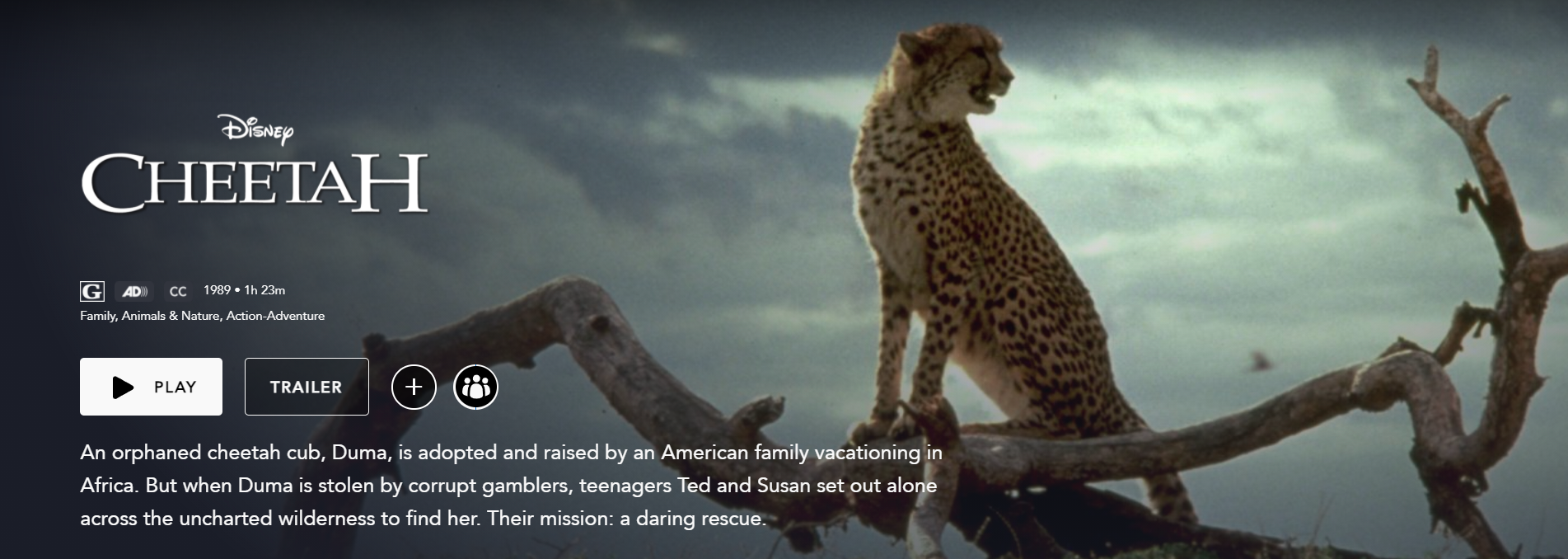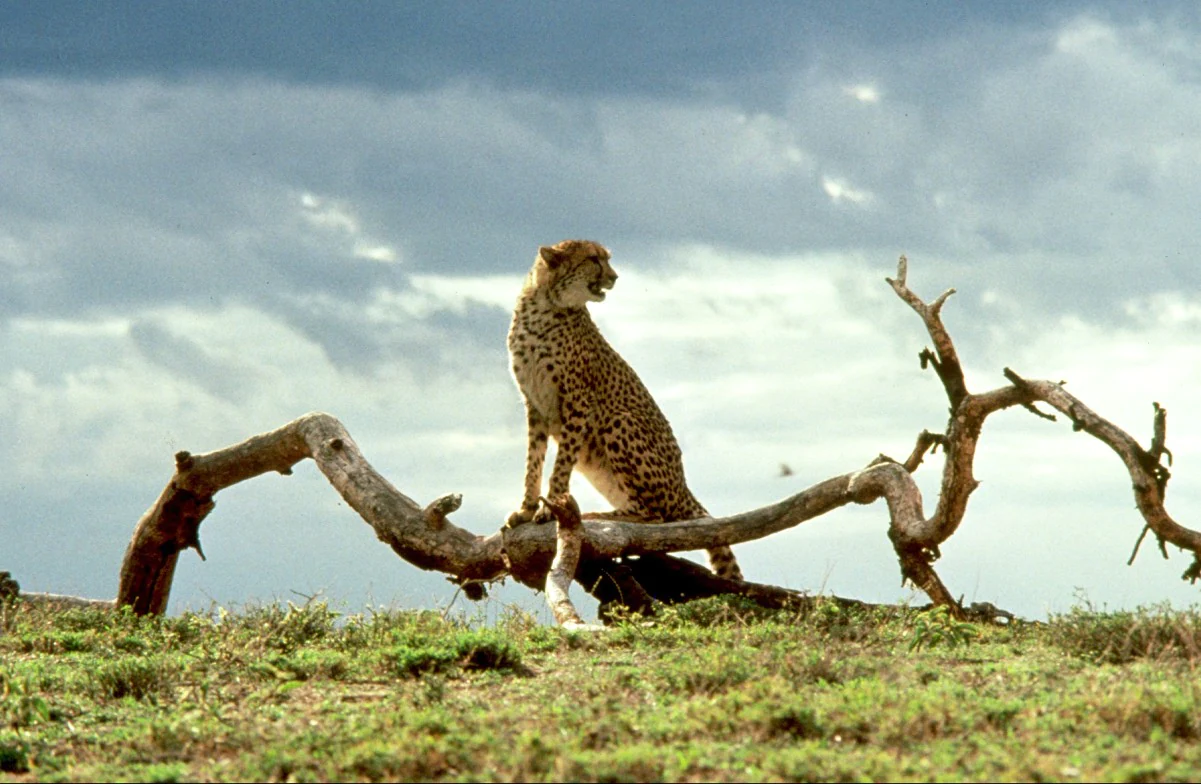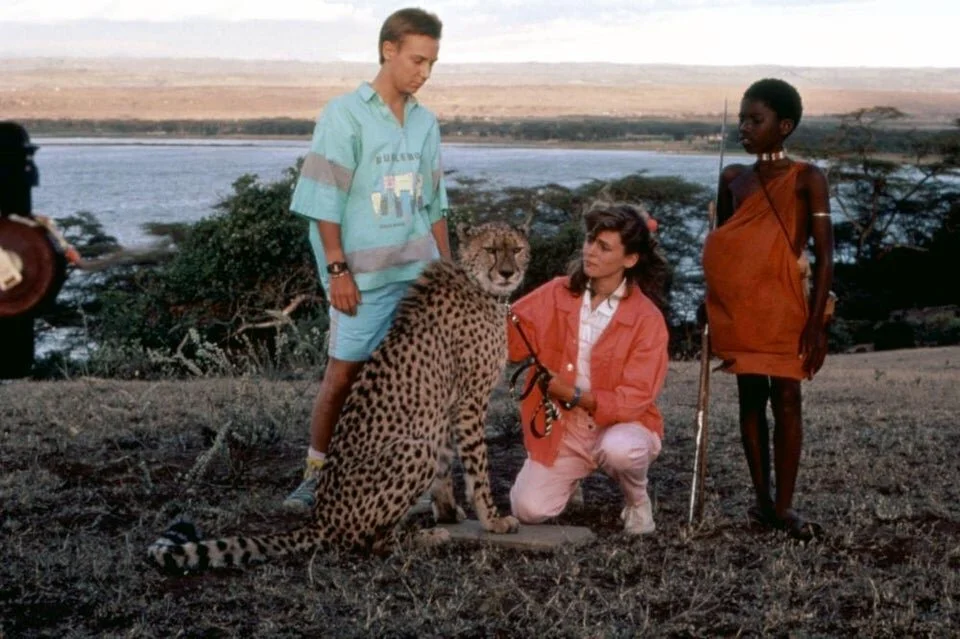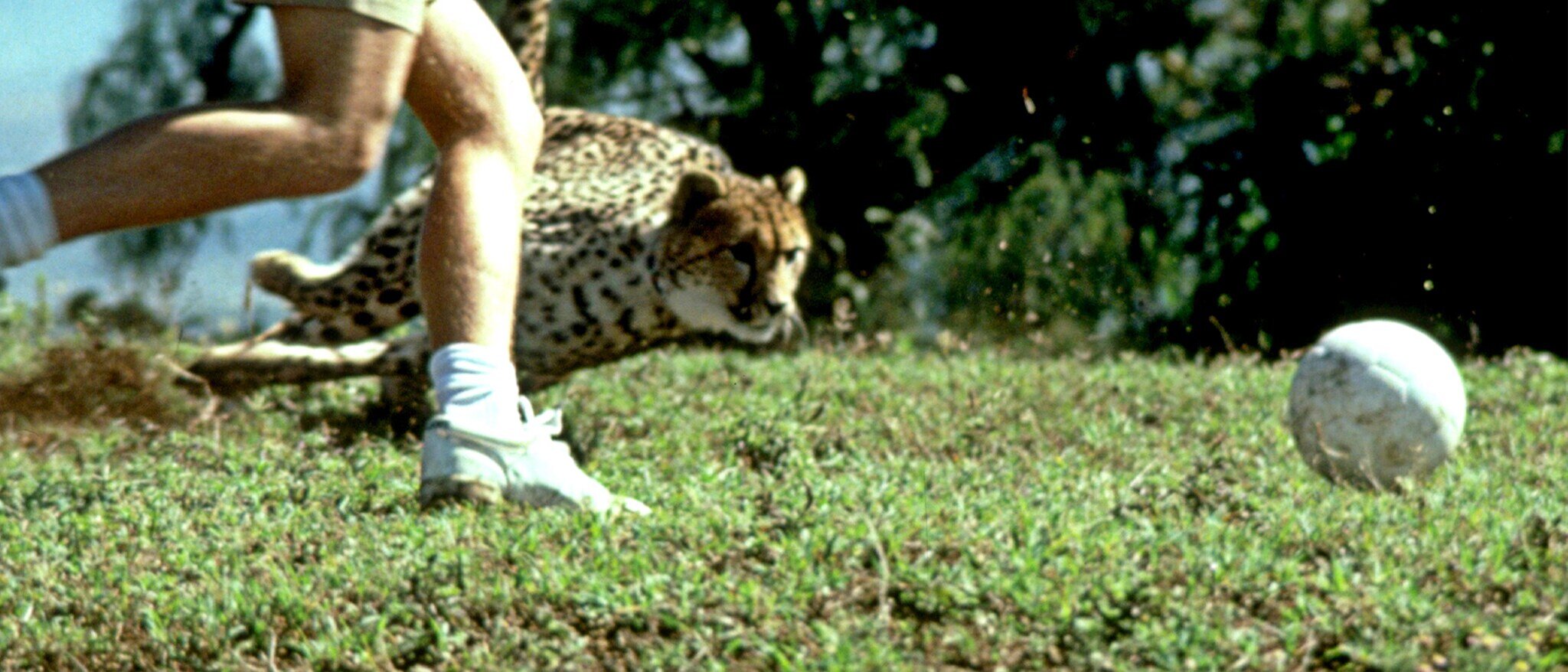Review: Cheetah (DMC #85)
This week we watched the 85th movie in our Disnerd Movie Challenge—Cheetah! It’s a new one for the both of us. If you also haven’t seen it, get yourself up to speed with our synopsis below. Otherwise, head straight to our review.
Synopsis
Siblings Ted and Susan Johnson have flown to Kenya to join their parents for the next six months. Their father, Earl, works at a tracking station for NASA while their mother, Jean, works at a clinic. Ted is excited at the idea of living in Africa for a while because he thinks it will be rough and he’ll get to see all sorts of wild animals, but Ted is disappointed when his parents take him and Susan to a house that looks and feels no different than their home back in Pasadena, California. The next day, Ted spots a nearby watering hole and runs off to check it out, despite his parents forbidding them from going anywhere, while Susan reluctantly follows. At the watering hole, they meet a friendly boy named Morogo, who shows the siblings some of the wildlife in the area. The next day they hang out with Morogo in his village where he introduces them to a game he likes to play—in turn, Ted and Susan take Morogo to their house and teach him how to play video games. Jean arrives home early and is shocked to see Morogo. At dinner that evening, Susan persuades her parents to let her and Ted explore with Morogo since he knows the area and they will be safe with him, to which their parents agree. Some time later, Ted, Susan, and Morogo are out playing when Ted accidentally kicks a soccer ball too close to a sleeping rhino. Though the siblings say they can get it later, Morogo quietly walks up to the rhino and grabs the ball while placing a small rock on top of the rhino. Morogo gives Ted another rock in turn, challenging him to do just what Morogo did. However, the rhino wakes up as Ted draws near it and Ted flees. Later, Morogo’s father, Kipoin, scolds his son for not attending to his goat-herding duties and spending too much time with Ted and Susan. Morogo defends his new friends, claiming he learns much from them, although he does admit he finds them strange for some of their eating habits.
One day, the three hear the cry of a baby female cheetah. Morogo is apprehensive to approach her in case her mother returns, but Ted and Susan find her anyway. Morogo tells Ted he found the mother—she was killed by a poacher. Ted notices some tire tracks and Morogo says they are actually shoe tracks with soles made from tires. Susan insists they take the cub home so it can survive. Earl and Jean are at first against their children keeping the cheetah, but Ted and Susan promise to be responsible and persuade their parents. They name the cub Duma, and over the next six months Duma grows into a adult cheetah and has truly become part of the family. The family goes into town and stops at a store belonging to a man named B. Patel. While Earl and Jean talk to Patel, Duma wanders off. Ted calls her back with a whistle. Patel expresses surprise and admiration that they managed to tame a wild cheetah. As the six months come to a close, Ted and Susan are faced with the reality they will have to return home and leave Morogo and Duma behind. Their parents suggest freeing Duma per the advice of an Australian game warden named Larry, although the warden cautions that Duma may not be fit to be a wild cheetah after being in the company of humans for so long. Patel, who overhears the conversation, offers to buy Duma from the Johnsons, but Susan flatly refuses. It is revealed that Patel wants Duma only to use her to win bets in a race against greyhound dogs. Meanwhile, Ted, Susan, and Morogo try to teach Duma how to hunt, but Duma’s progress is slow. Back at Patel’s shop, Patel meets with an English businessman named Nigel and a local poacher named Abdullah. They discuss a plan to bet against Duma in the race against the greyhounds, owing to the fact that Duma tires out quickly. The night before Ted and Susan leave Africa, Patel breaks into their house and steals Ted’s whistle. He calls Duma to him, and he, Nigel, and Abdullah capture the cheetah. The next morning, Ted and Susan are sad that they can’t find Duma, though Susan expresses hope that it means Duma is getting better at hunting. Ted and Susan share a somber goodbye with Morogo, then leave for the airport with their parents. However, Ted can’t shake the feeling that Duma left a bit too suddenly. The family stops at Patel’s shop, and Patel’s words that the family “lost” their pet causes Ted to be suspicious. He also notices Abdullah’s shoes match the tread marks he saw six months prior. He deduces that Abdullah is the poacher that killed Duma’s mother. Though he tries to convince his parents that Patel has something to do with Duma’s disappearance, Earl and Jean dismiss his concerns.
The siblings are dropped off at the airport. As they walk towards their flight, Ted lays out all the evidence he has about Patel, including his missing whistle. He says that he planned to give the whistle to Morogo as a goodbye present, prompting Susan to say she believes him. The kids purposely miss their flight and send a telegram to their grandmother pretending it’s from Earl, letting her know the plane is delayed. They return to Patel’s shop and learn from the shopkeeper’s cousin that Patel is at a retreat camp in Jamhuri. Ted and Susan ask Morogo for his help in rescuing Duma, but Morogo is only able to give them directions to Jamhuri. Susan tells Ted that they don’t have enough resources to do this on their own and suggests they return to their parents for help, which Ted refuses. They are soon joined by Morogo, who snuck away from his home after deciding to help his friends by leading them to the camp. At the camp, Abdullah, Patel, and Nigel begin their own form of harsh training with Duma. They withhold food from her and make her run until she tires out as a way to show her they are the ones in control. Meanwhile, Morogo’s parents realize he has gone missing. Kipoin informs Earl. Earl calls his mother and is informed of the telegram, making him realize Ted and Susan never got on the plane. Earl later informs the police of the missing children. Both Jean and Kipoin’s wife, Lani, insist on heading out to look for the children themselves. In Jamhuri, the kids finally find the camp and scout the area before deciding to rescue Duma that night. Ted and Susan sneak into the compound and discover why Patel stole Duma. While trying to free Duma they are captured by the poachers and locked in a cage. The poachers decide they will take care of the siblings after the race is over and depart for Nairobi with Duma. Morogo, who managed to avoid capture, frees Ted and Susan with Susan’s help; she watched the poachers unlock the cage and memorized the lock combination.
Ted, Susan, and Morogo head to Nairobi on foot, but they are picked up by a policeman who has been looking for them. They manage to sneak away from him and hitch a ride in a pickup truck, where they convince the driver to take them to Nairobi. At the police station, the parents find a flyer for the race and realize their children are heading there. At the racetrack, the poachers prepare Duma for the race and Patel makes illegal bets with some of the patrons, betting that Duma will lose to the greyhounds. Ted, Susan, and Morogo arrive just as the race begins. Duma starts off the race well in the lead but she soon begins to tire out, allowing the greyhounds overtake her. Ted spots a security guard wearing a whistle which he snatches and blows. Duma hears the whistle and sees Ted and Susan. The cheetah gets a second wind and regains her speed. However, instead of running towards the siblings she instead overtakes the greyhounds and wins the race. Patel and Nigel are shocked as the patrons who bet on Duma immediately begin cashing in on their winnings. The parents arrive at the track and are reunited with their children, though Ted and Susan tell them they still need to stop Abdullah. Duma turns on Abdullah and chases after him, knocking him to the ground and attacking him. Earl pulls Duma off Abdullah, who is promptly arrested. Some time later, the families take Duma to a hilltop intending to release her. Jean suggests Ted and Susan stay for another month before releasing Duma. The siblings say that it’s time to let her go and be a normal cheetah now that she is getting better at hunting. They notice another cheetah in the distance and tearfully release Duma. She initially refuses to leave until Susan convinces her. As they watch Duma leave, Ted, Susan, and Morogo share a quote: “Though we are far apart, our spirits share the same earth and the same sky.” The three children watch as Duma joins the other cheetah and plays with her new friend.
Thoughts Before Watching
Kevin: I don’t think I’ve heard of this, let alone seen it. Then again, with a title just called Cheetah it’s difficult to determine how familiar it is. At first I thought this might have been a nature documentary, but after reading the description on Disney Plus it’s clear that it’s not. It sounds intriguing though just going off the basic plot summary. I like the sound of its premise. Let’s dive on in and see what this is all about.
Megan: I’ve never seen this one before, either, but I do like cheetahs! I’m not going in with too high of hopes (there’s probably a reason we’ve never heard of this movie before now). However, I figure since this actually has a plot to it, it can’t be worse than those True Life Adventure nature documentaries we slogged through at the beginning of our challenge.
Thoughts After Watching
A basic but fairly engaging plot
Kevin: The plot is as simple as it can get for a movie with this premise. Although Duma is the film’s title character, the first 20 minutes or so are spent on Ted and Susan exploring Africa and striking up a friendship with Morogo. I liked that we got to spend a little bit of time watching these three children become friends since it helps establish the commitment they will later have when they try to rescue Duma. The three are opposed by a trifecta of antagonists in Mr. Patel, Nigel, and Abdullah, who work well as this film’s villains in spite of how simple they are, or perhaps because of it. Even though we’re rooting against these three, I have to say I actually kind of found them entertaining to watch, especially Patel and Nigel. They had the most amount of humor among the villains. Anyway, the plot comes to an end rather predictably when we see Ted, Susan, and Morogo let Duma go. As predicable as it was, however, it was actually a rather touching scene after spending the rest of the film watching the growing bond between the humans and Duma. With that said, if I had one criticism about the story, it’s that there’s a complete lack of any danger. The movie’s description on Disney Plus says that Ted and Susan will be embarking on a daring rescue, and various plot summaries across the internet also use words like “fight for survival” when describing this movie. Frankly, I never once believed the children were in any real danger, even when Ted and Susan were locked up in the cage by the villains. I was expecting we would see Ted and Susan experience some sort of real trouble when they began their journey to save Duma. Even Susan said that they lacked the resources to survive, but we didn’t get to see any of that. This is an example of the writers “telling” instead of “showing” since we’re only told the journey is treacherous without actually seeing it. For this reason, the mission to rescue Duma (while being somewhat endearing) feels a bit cheapened if only because there are no stakes to be seen.
Megan: Another contributing factor to the lack of stakes in this story is the somewhat meandering plot. Sure, we get the standard story beats we’d expect (Inciting Incident of finding the baby cheetah, Fun and Games of raising the cheetah, Bad Guys Close In, All Is Lost, etc.), but they don’t all land as strong as they could. For instance, having watched the movie, it took me a while to pinpoint what the Midpoint actually is. In terms of timing, the precise middle of the movie occurs when Ted and Susan ask Patel’s cousin where they can find Patel. However, the emotional midpoint of the movie happens shortly before this when the brother and sister decide not to board their plane as scheduled. It’s not nearly as memorable a turning point in the movie as, say, Duma being kidnapped, or the All Is Lost moment when it looks like the bad guys are going to get away after having trapped the kids and taken Duma to the races.
Also, to Kevin’s point, though Duma is the titular character—the cheetah—this really is Ted’s story. It’s Ted who experiences the full emotional character arc over the course of the film, and its his decisions (with Susan’s influence) that drive the story forward.
Kevin: I also appreciated that the movie gives us some nice little payoffs. For example, we learn that Abdullah is the poacher who killed Duma’s mother. The film could just have easily not made Duma’s mother’s killer and Abdullah the same person. By doing so, there’s now a history between Duma and Abdullah, making it all the more satisfying when the cheetah chases him down and helps catch him so he can face justice. While I doubt Duma went after the poacher knowing he was responsible for her mother’s death, and most likely only did it because of the harsh conditions Abdullah put her through, this scene is satisfying just for the audience alone. Another cool payoff was the whistle and how it relates to Patel’s downfall to a degree. I thought it was funny that Patel essentially wasted so much time trying to steal Ted’s whistle in his attempt to capture Duma, because when Ted later uses a whistle from a security guard the implication is that Duma can be called using any whistle of similar sound and size. As we see, this action causes Duma to be reinvigorated upon spotting Ted, allowing her to win the race and causing Patel to lose his bets. Rather than go through all the trouble of stealing Ted’s whistle, it seems that Patel could have just found a similar one. That said, I suppose it could also be that he simply didn’t know if another one could work. The humor is created because we as the audience realize that Patel made his plan more complicated than it needed to be. These types of moments are fun for the audience to observe and figure out, and they help make the movie more engaging. Still, even with how well the movie uses its plot, there’s not much re-watch value here. A one-time viewing is more than enough for this film.
Culture Shock
Megan: It would have been too easy for this film to stray into racist territory with a white American family in Africa, but I was pleasantly surprised at how well this older film respected African culture by giving us what appears to be an accurate portrayal of life there (as accurate as one can see in a Hollywood film, at least; though we’re also Americans who’ve never been to Africa, so I could be wrong in that assessment). One of my favorite moments in the film was playing off of American audiences’ expectations with this exchange between Morogo and his parents:
KIPOIN: They are mzungu. They’re not like us. Have you seen them eat cattle?
MOROGO: Worse… I’ve seen them eat fish!
LANI: That is disgusting to talk about at dinner. Drink your cow’s blood and milk.
I love that we’re hearing an African family talk about how disgusting an American diet is while an American audience is watching and thinking how disgusting the African diet is. It really makes you laugh and realize that we are all humans with our own perceptions of what is “normal” and how one person’s “normal” might be something totally disgusting to someone else.
The parents are so frustrating
Kevin: Am I alone in this, or were the parents just annoying to watch? Specifically, I’m referring to Earl and Jean Johnson. I don’t know if it’s because Ted and Susan express exasperation with their parents (after all, we’re supposed to identify with them as our main characters), but I found myself wanting to roll my eyes most of the time the parents were on screen and speaking. I understand and can sympathize with them wanting to make sure their children are safe, but I really could not quite understand why they were completely unwilling to allow their kids to explore Kenya. I have to wonder if they were planning to do anything with their children in those six months. We don’t find out, since once Duma arrives on screen the six months fly by very quickly. It was also frustrating how often they kept dismissing Ted’s concerns when he tried to tell them Patel had something to do with Duma’s capture. I’m not saying they were wrong for not seeing it from Ted’s point of view, but it would have been nice if they had at least tried. Like a lot of things in this movie, we as the audience are privy to what’s going on before most of the characters are, so I couldn’t help but be slightly annoyed that it took the parents so long to get up to speed. Part of my problem with it is it also just made the parents look extremely inept. I get this movie was about the children, and so we see the story unfold through their perspectives, but I was still dumbfounded at how often the Johnson parents were slow to react. However, I will give some points to Jean (as well as Lani, Morogo’s mother) for deciding to go find their missing children themselves instead of just letting the police handle it. At least that gives the mothers some agency.
Squeaking by with a Bechdel Test pass
Megan: With all the named female characters in this film, thank goodness it actually passes the Bechdel Test, if only just barely. Right at the beginning of the film we have Jean greeting Susan after she and Ted arrive at the airport. Though their conversation has nothing to do with the film’s male characters, it’s not exactly the best conversation—Jean immediately comments on Susan’s weight and eating habits before opening up the conversation to both Susan and Ted.
JEAN: You’ve lost weight. You must start eating like a normal human being. How was it with Grandma? Were you terribly lonely, guys?
TED: It was only a month, Mom. It was no big deal.
SUSAN: But we missed you, of course.
Though Susan does get to respond to her mother, thus passing the Bechdel Test, did the writers have to have the mother/daughter relationship perpetuate unattainable female beauty standards by commenting on Susan’s appearance? If they were trying to underscore that Jean is a terrible mother (a la Mother Gothel from Tangled), I’d allow it, but Susan doesn’t seem to take issue with her mother’s comment, so if that was supposed to be character development, I’m not buying it.
Sadly, this is the only conversation that passes the Bechdel Test in this film because it is the only conversation directly between two female characters. Jean and Susan are in several family conversations with Ted and Earl, but the questions or responses they speak are directed to the group of male and female characters, never directly to another female character. The same goes for the conversation between the Johnsons and Morogo’s parents. Though both mothers speak in that scene, they do not speak directly to each other. Instead they address the group as a whole or just Earl.
Aside from Jean’s remark about Susan’s weight, however, the only other sexist moments in the film are when Susan or Duma (yes, the cheetah is a girl) become damsels in distress when they’re captured by the villains. To these characters’ credit, however, they are not solely damsels in distress throughout the movie. Sure, Susan is a bit stereotypically afraid of a snake when the boys aren’t, but she’s also the one who thinks being chased by an elephant was a totally cool adventure. She’s also the only one smart enough to pay attention to the combination lock code when she and Ted are captured so that she can use that knowledge later to get out (even if she weirdly still needs to rely on a boy, Morogo, to do the unlocking for her). Duma, of course, gets badass points for being a cheetah. Sure, she needs a little practice at becoming a wild cheetah who can hunt for her own food, but once she gets in touch with her wild nature, there’s no stopping her.
Gorgeous shots of the African landscape
Kevin: I’ll be brief here; I really enjoyed the shots of the Kenyan landscape and the wildlife. I’ve heard some criticism was thrown at the home video release of this movie because it severely cropped the original widescreen format of the theatrical cut. I don’t know if the Disney Plus version is based on the home video release, but I wasn’t all that disappointed with the shots. Then again, I never saw this film in its original version, so I have no idea if the format was cropped as much as folks say it was. I will say, though, that some of the earlier shots of the baby cheetah playing Duma were a bit jarring. It’s clear that the footage here is not the same as the rest of the film. In fact, those shots look like they were taken straight from a documentary. I’m curious as to why these shots are the way they are when it seems like they managed to get good footage for the rest of the film. Anyway, as noticeable as it is, it thankfully doesn’t take away from the rest of the movie’s gorgeous looking vistas.
Megan: Even with those obvious straight-out-of-a-documentary shots, one of the things I enjoyed about this film was seeing all the different animals roaming the African plains. It really helped with the world building to give us a sense of these American kids being totally out of their element. I also appreciated that the cheetah playing Duma seemed to have been treated with respect in the filming of this movie. I’m still a little conflicted about having a trained cheetah for such a film, especially given how much a real cheetah needs to be able to run out in the wild, but it did seem like this cheetah was truly having fun with the actors.







